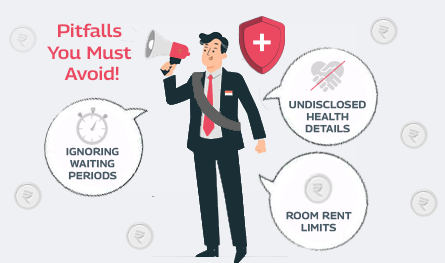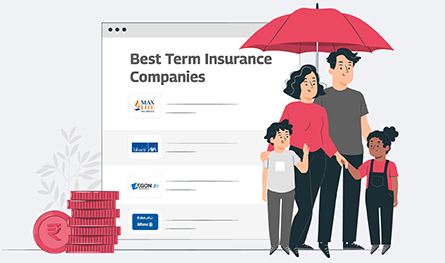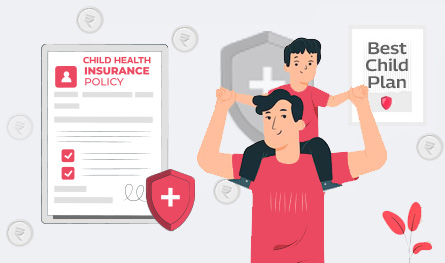What Are The Tax Benefits Of Term Insurance?
.png)
.png)
You must buy a term plan so that you can secure the financial future of your family in case you die prematurely. In fact, the money that your beneficiaries get from such a policy would be good for them even in case you died at an advanced age. With the help of the sum assured that they get from such a policy your family members can retain a sense of financial independence in their lives. They can fulfill all the financial goals that they have in life and meet all the obligations. Apart from that, you get term insurance tax benefit in these cases.
The money that they get from a term plan would help your family members settle dues such as paying home loans or sponsoring the higher education of your child. The term insurance plans help you save taxes as well as we have indicated already. They are a great tool in that regard but you should know term insurance comes under which section. As we have said already, when you have a term policy you need not worry about the financial aspect of your family members’ lives in your absence. So it is like a double whammy over here!
Term Insurance Tax Benefit under Section 80C
Is term insurance covered under 80C? Well, it most certainly is. As per Section 80C of the Income Tax Act, 1961 you get a maximum tax exemption of 1.5 lakh rupees per year for your money back plan as well as your term insurance policy. Now, this benefit can only be availed of by yourself or the assesses, your dependent kids, and your spouse. However, there are a few clauses that have to be kept in mind in this context. Has your term policy been issued after 1st April 2012?
In that case, the tax deduction would be applicable only if the total premium amount is no more than 10% of the sum assured guaranteed under the policy. If your term plan has been issued before or on 31st March 2012 the tax deduction would apply only if the total premium amount does not exceed 20% of the sum assured being provided by the policy. So, when you think of term plan tax benefit this is something that you should think of. Are you suffering from any illness or disability? In that case, the tax deduction would come into play only if the premiums you have paid amount to less than 15% of the sum assured.
Term Insurance Tax Benefit under Section 10 (10D)
As per Section 10 (10D) of the Income Tax Act, 1961, the term insurance tax benefit that you get is primarily an exemption benefit. This particular section states any amount that you get as a death benefit would be exempted from being subjected to income tax. This benefit is in fact also applicable to the maturity benefit that you receive in a money-back plan. This also includes the bonuses that may accrue to you in these cases.
In this case, it also does not matter as to where you got the money from – India or any other country. So, this is a major term plan tax benefit for sure. However, there are certain restrictions in this case that you must know about as well. If you have got the amount under Section 80DDA (3) or 80DD (3) this particular benefit would not be applicable. Have you received the money from the Keyman Insurance Policy? Then this benefit would be withdrawn. If your policy has not been issued between 1st April 2003 and 31st March 2012 the death benefit being provided by the same would not qualify for the benefit.
Term Insurance Tax Benefit under Section 80D
Term insurance comes under 80c or 80d? This is something that a lot of people wonder about. Well, as you can see for yourself now, you get benefited by both the sections in this case. As per Section 80D of the Income Tax Act, 1961 you get tax benefits on the premiums that you are paying for health insurance. So, if your term policy has a provision for the likes of critical illness coverage, hospital care coverage, and surgical care coverage you can get the tax benefits that accrue to you in this case.
Please remember that the term insurance tax benefit 80D can be availed of by certain entities such as yourself, your dependent kids, your spouse, and your parents. In the case of parents, it does not matter if they depend on you financially or not. There are however a few limits when it comes to the deductions in this case and you must know about them as well. The maximum tax deduction that you can get in this case is 25,000 rupees. The limit is the same even in case you have bought the policy in your parents’ name.
The refund details in the free-look periods of the term policies
IRDA (Insurance Regulatory and Development Authority) always tries to create and regulate the market in such a way that the environment is favorable for the customers as well. This is only made better by the term insurance tax benefit that we have talked about over here. The free-look period is one such benefit. This particular provision states that you can always return a term policy within a certain period if you are not satisfied with its terms and conditions. In the case of offline policies, this is 15 days, and in the case of online policies, this is 30 days from the date when you received the policy.
The insurer in this case would issue you a refund after making some necessary deductions. When it comes to term plan tax benefit the Section 80C helps you save as much as 1.5 lakh rupees per year. Section 80D helps you save 25,000 rupees on premiums along with a further 25,000 rupees on the policy that you have bought for your parents. In case your parents are senior citizens this would go up to 50,000 rupees.

Author Bio
Paybima Team
Paybima is an Indian insurance aggregator on a mission to make insurance simple for people. Paybima is the Digital arm of the already established and trusted Mahindra Insurance Brokers Ltd., a reputed name in the insurance broking industry with 21 years of experience. Paybima promises you the easy-to-access online platform to buy insurance policies, and also extend their unrelented assistance with all your policy related queries and services.
Other Life Insurance Products
Latest Post

Health insurance plans are purchased with the hope of medical protection in times of need. However, sometimes it ends up being a source of surprise and disappointment. This mostly happens when people rush to buy health insurance plans, often overlooking essential aspects. Ignoring waiting period clauses, misunderstanding exclusions, and being unaware of sub-limits can lead to unwanted problems in the future.


Term insurance is an important investment. However, with the availability of so many insurers offering term plans, it becomes difficult to select the best term plan to suit your needs. Buying a term plan needs some consideration and research on the part of the policyholder. In this post, let us discuss the best term insurance providers in India.


If you think of life insurance, chances are you are picturing something people buy in their 30s or 40s. But what if you are 65 or older and just getting started? The good news is that you are never too late. Whether you are thinking of easing the financial burden on your family, covering final expenses, or simply leaving behind a legacy, there are life insurance options tailored just for you.
This article will be a guide to life insurance for senior citizens above 65 years, explaining why it is important, the type of insurance options, and how to get the right policy for you.


As any parent will tell you, kids come with two things: endless energy and absolutely no sense of self-preservation. From scaling chairs and tables like mountaineers to catching germs within a five-mile radius, kids really know how to keep everyone on their toes. Now, it is understandable you are worried. As much as we would love to wrap our small ones in cotton wool and keep them safe forever, real life has other plans.

.png)
It is very important to know the car insurance cost in India so that you can find the affordable policy that you are looking for in this case.




